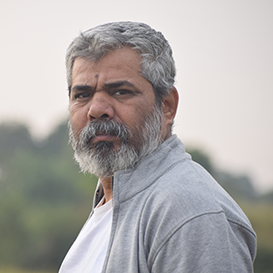Lines and Smudges: Exploring Charcoal in Art
From the cave to the gallery—art using charcoal has continued to evolve in texture, form, and technique. What role does this medium play in Indian art history? How have artists used charcoal to create unique works? And how can you start using it in your own art practice?
In this workshop, artists Jayant Hubli and Navin Kushwah shared their journey of using charcoal in their practice. Participants worked with the duo to create their own artwork, some of which were displayed at Science Gallery Bengaluru during the CARBON exhibition-season!
About the Artist
Jayant B Hubli has had a very scholastic career path in art after his Graduation and Masters in Visual Art from CAVA Mysuru and Kalanikeran, Mysore University. Pursuing art and participating in various prestigious shows with solo and group activity in offsites and art camps, Hubli was adjudged the second best painter in the world contest conducted by Winsor Newton in 1997. He was also given the prestigious State Lalit Kala Academy Karnataka award in 2003, followed by the Mysore Dasara Award from amongst thousand participants. Presently he pursues his art with charcoal and acrylic mediums as his artworks are coveted by collectors and corporates all over India and overseas too. Jayant B Hubli is also an active collaborative President of Art Beru India which conducts shows and art initiatives at various institutions and NGOs.
About the Artist
Navin Kushwah is a versatile creative professional known for his work as an artist, filmmaker, production designer, and facilitator. He focuses on capturing the essence of landscapes, emphasising cultural practices and traditions unique to each place. Kushwah’s artistic journey revolves around the belief in documenting the transition of places and engaging with diverse environments. He serves as an Artist in Residence and facilitator with LLN (Living Labs Network & Forum), an organisation rooted in the Deccan region.
He is also the driving force behind Agamashaala, a collective dedicated to mutual learning and collaborative creation, often working with NGOs. He envisions experiential spaces and collaborative shows that emphasise co-learning and co-creating with communities. The ethos of Agamashaala revolves around fostering a welcoming environment for all individuals interested in embarking on creative journeys.



